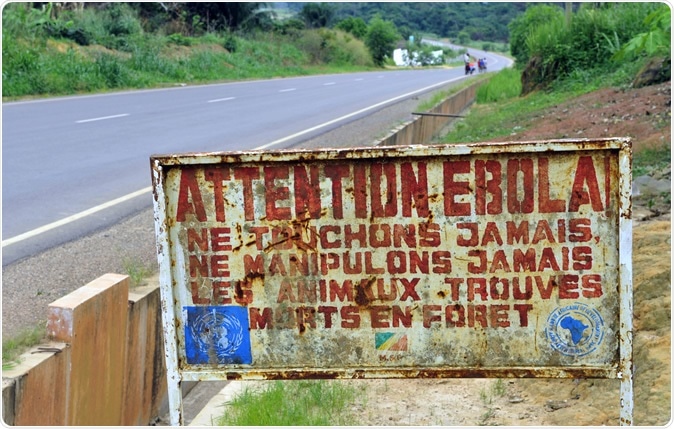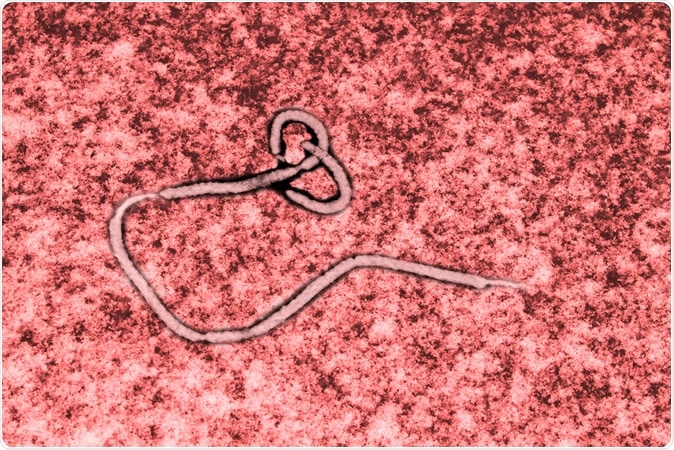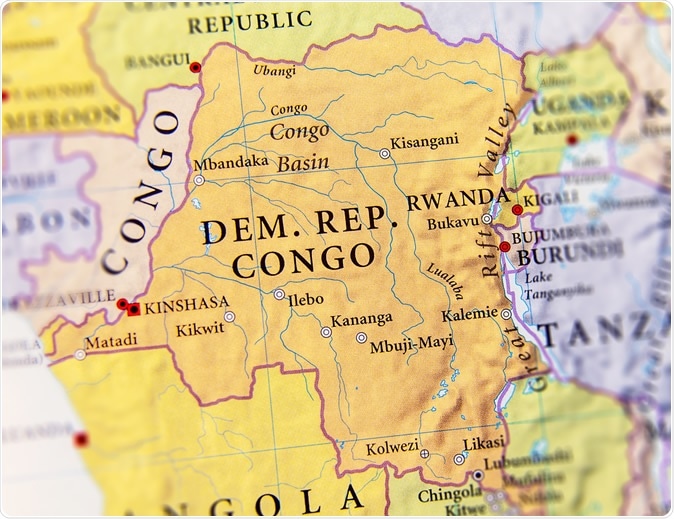It was a year ago that the Ebola virus outbreak in the Congo became official. And far from subsiding, just two weeks ago it became “a public health emergency of international concern”. More than 2,600 cases have been confirmed and over 1,800 deaths in the affected provinces of the Democratic Republic of the Congo. A third of these are children.

MAKOUA, CONGO, AFRICA - A sign warns visitors that area is a Ebola infected. Image Credit: Sergey Uryadnikov / Shutterstock
Anyone who is involved in caring for an infected person becomes a potential mark for the virus. It spreads in all directions and thus hampers social contact with others in multiple ways. Affecting businesses, educational institutions, village fairs, health services – the virus has made it almost impossible to conduct life normally in affected areas as the fear of contracting the disease looms larger than life over every area of activity. Meanwhile, those engaged in treating and controlling this scourge are being killed by armed militants. The greatest enemies are political turmoil as the health ministry in the DRC undergoes upheavals, armed violence, and suspicion of government efforts by the local communities, which hinder public health efforts and threaten to send the situation out of control.

Ebola virus seen under a microscope. Image Credit: Studio_3321 / ShHutterstock
The disease is spreading to neighboring countries and to border cities like Goma with populations of over 1 million, making it a perfect candidate for international spread. This underlines the need for intensified surveillance and control measures across national boundaries, and more investment in this resource-poor region. The WHO has advised that banning travel to these and neighboring countries are counterproductive in containing the spread of the virus. In response, the Rwandan government reopened the border with the DRC which had been closed after the report of two Goma cases.

Geographic map of Democratic Republic Congo. Image Credit: Bennian / Shutterstock
The United Nations (UN) and allied agencies are scaling up their response to help the government of the DRC keep the epidemic within control and bring other countries into the loop for proper partnerships to be forged. The greatest task for the UN at this date is to ensure that health workers are able to work securely and efficiently in this situation of armed conflict, ensure access to medical care, and build community and political support for public health efforts. It is also striving to ensure their physical security and logistical support. More action is required to meet the needs of people in the affected areas, which includes working towards peace, stopping attacks on existing health facilities, and dealing with displaced populations.
Health workers in Congo are mostly drawn from the local population and continue to work to prevent the transmission of the disease despite the contradictory demands of health care in a zone of continuing military action. However, the UN calls upon all parties to the conflict to ensure that patients and others seeking medical care can get it without fear, and that healthcare workers can do their work safely.
Despite the stresses of civil war, the government of the DRC has supported the efforts of the WHO and other partners to achieve a lot:
- More than 170,000 vaccinees and 1,300 cutting-edge treatments administered
- 77 million people screened at national and international transit points
- Daily visits to 20,000 contacts to pick up sickness, and 3,000 samples tested each week
- Over 440,000 provided with food so that they do not have to go elsewhere to get it, whether patients or contacts, thus limiting their movement among uninfected people
- 25,000 school children given meals daily to help build community trust in government-led initiatives
- Over 2,000 community engagement workers mobilizing and supporting local communities
The challenge is to ensure that every single Ebola case is treated, and every contact traced and properly managed. This includes air transport facilities to reach and treat patients in remote areas, storage facilities for vaccines and other valuable healthcare resources.
Even more difficult is the challenge to win the trust of the community, which suspects Ebola to be a fraud, suspects the motives of foreign donors and healthcare workers, and is subjected to intense misleading propaganda about the treatment centers set up to handle patients and contacts. This means that quarantine, contact tracing and vaccination, and monitoring contacts, are extremely difficult. One in three deaths occur in homes where the risk of spread is high. The investment needed to build community support and relieve suspicion, as well as to make health support facilities available, is heavy, and international support is essential.
Already, Merck (which is the provider of the only DRC-approved Ebola vaccine) states it has supplied over 200,000 doses to the WHO over the last year and aims to supply another 900,000 over the next year or two. This vaccine protects 99% of people within 10 days. Recently the DRC has switched to using half-doses of each vaccine shot which doubles the stock available while keeping the effectiveness high.
Vaccine supplies could be augmented if other experimental vaccines were also tested by the DRC but there are political, logistical and practical problems to this, such as their experimental status, the longer time required for immune response and the lower efficacy.
The WHO statement sums up: “At this critical juncture, we reaffirm our collective commitment to the people of the DRC; we mourn for those we have lost; and we call for solidarity to end this outbreak.”